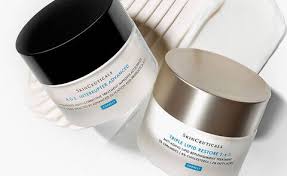
Best Anti-Aging Face Moisturizers: A Dermatologist’s Guide to Youthful Skin
When it comes to anti-aging skincare, no single cream works for everyone. That’s because your skin is unique — and what works for one skin type may cause issues for another.
As dermatologists, we’re often asked: What’s the best anti-aging moisturizer? The honest answer is: it depends on your Baumann Skin Type®, your lifestyle, and your skin’s current condition.
Why Anti-Aging Moisturizers Matter
Moisturizers are more than just hydration. The right anti-aging face moisturizer can:
Reduce fine lines
Firm sagging skin
Improve texture and tone
Boost the effects of other skincare products
Choosing the wrong one, however, can cancel out expensive serums or even cause breakouts, irritation, or dryness.
Step 1: Start with a Sunscreen
Before anything else, daily sunscreen is the most important anti-aging product. UV rays break down collagen and accelerate aging. No cream can reverse damage that continues daily from unprotected sun exposure.
Step 2: Add a Retinoid-Based Moisturizer
Retinoids are the gold standard for anti-aging. These Vitamin A derivatives are clinically proven to:
Stimulate collagen
Improve skin cell turnover
Reduce acne and smooth fine lines
Start with a low-strength retinol and increase gradually.
Top Retinoid Moisturizers for Beginners
Essopi Retinol Treatment Serum 2X: Gentle but effective. Ideal for normal and oily skin. Dry skin types should layer it under a moisturizer.
Medature Encapsulated Retinol Serum: Time-released delivery system minimizes irritation. Great for sensitive skin types.
La Roche-Posay Effaclar Adapalene Gel 0.1%: Originally an acne treatment, now available OTC. Retinoid benefits without harshness.
Skinceuticals Retinol 0.3: A trusted brand with several strengths. Start low, and work your way up.
Step 3: Consider Vitamin C – In Serum Form
Vitamin C is another proven anti-aging ingredient. But it doesn’t work well in moisturizers. For best results, use a separate Vitamin C serum in the morning. Pair it with sunscreen for antioxidant protection.
Our top moisturizing Vitamin C product is Skinceuticals C E Ferulic, though it’s a serum, not a cream.
Anti-Aging Moisturizers by Skin Type
Understanding your skin type is crucial. The wrong product can worsen skin conditions or cancel out benefits. Here’s a guide based on common skin concerns.
1. Anti-Aging for Oily or Acne-Prone Skin
Good news: retinoids help both acne and wrinkles. Look for lightweight, non-comedogenic formulas with antioxidants and soothing ingredients.
Top Picks:
Essopi Triple Antioxidant Serum: Green tea, caffeine, and resveratrol fight free radicals and reduce inflammation.
Neocutis Hyalis+ Intensive Hydrating Serum: Deep hydration from hyaluronic acid without clogging pores.
2. Anti-Aging Moisturizers for Dry, Acne-Prone Skin
This is tricky because most acne treatments dry the skin. You need to combine acne treatment with a barrier-repairing, non-comedogenic moisturizer.
Recommended Products:
Zerafite Soothing and Calming Moisturizer: Contains argan oil, MLE technology, and stearic acid for barrier repair.
Essopi Triple Antioxidant Cream: Lighter than the serum, but still packed with skin-calming, anti-aging ingredients.
3. Anti-Aging for Sensitive Skin with Rosacea
Rosacea-prone skin often reacts poorly to retinoids. Start by calming inflammation, then introduce retinoids slowly.
Use retinol-free anti-aging creams first.
Great Choices:
Sente Dermal Repair Cream: Contains heparan sulfate for hydration and repair. Gentle and soothing.
Defenage 24/7 Barrier Balance Cream: Uses defensins to stimulate new skin growth. Quick results, though temporary.
4. Best for Extremely Dry or Mature Skin
Extremely dry skin needs deep hydration and collagen support. Use a barrier-repairing cream along with an anti-aging active.
Best Routine:
Layer a retinoid at night under a rich, nourishing cream.
Use calming, non-stripping cleansers to preserve the moisture barrier.
5. Best for Combination Skin
Combination skin may tolerate gentle acids and light retinoids. Avoid over-exfoliating by choosing either an acid or retinol, not both at the same time.
Top Products:
Skinceuticals Renew Overnight Dry: Contains hydroxy acids. Use on non-retinol nights.
Glycolix Elite Glycolic Acid Cream: Available in 10%, 15%, and 20%. Start low and go slow.
Hydration Boosters: Hyaluronic Acid Moisturizers
Hyaluronic acid (HA) attracts moisture to the skin, making it look plump and refreshed. These moisturizers are great for short-term wrinkle reduction due to dehydration.
HA works best when paired with a cream to lock in moisture.
Recommended HA Moisturizers:
ClarityRx Feel Better HA Cream: Contains jojoba oil and hyaluronic acid for soothing hydration.
SkinMedica HA5 Rejuvenating Hydrator: Hydrates and plumps fine lines. Popular after peels or microneedling.
Sente Dermal Repair Cream: Uses heparan sulfate instead of HA. Works similarly to bind water and soothe skin.
Sensitive to Retinol? Try These Alternatives
Not everyone tolerates retinoids. If you’re among them, try these retinol-free anti-aging moisturizers:
Defenage 24/7 Barrier Balance Cream: Great for quick results, though benefits fade without continued use.
Sente Dermal Repair Cream: Hydrates, firms, and improves absorption of other anti-aging actives.
Mistakes to Avoid with Anti-Aging Moisturizers
Using the wrong product for your skin type
Combining exfoliants like acids and retinol improperly
Using too many active ingredients at once
Not applying in the right order
Skipping sunscreen
Even the best anti-aging cream won’t work if it’s layered incorrectly or paired with incompatible products.
The Best Solution? Get a Personalized Routine
The quickest way to avoid mistakes is to take the Baumann Skin Type Quiz. You’ll get a dermatologist-curated skincare routine that fits your skin and lifestyle.
No guesswork. No wasting money on the wrong products. Just science-backed results tailored to you.
Final Thoughts: Your Path to Youthful Skin
Anti-aging skincare is a journey, not a miracle in a bottle. Start with sunscreen, add retinoids, and choose a moisturizer that fits your skin type.
Hydration, collagen support, and inflammation control are the pillars of youthful skin. Get those right, and you’ll see lasting results.
And remember: your best anti-aging moisturizer is the one that works with — not against — your unique skin.
If you’re unsure where to begin, start simple: cleanse, moisturize, and protect.
As your skin adjusts, you can introduce retinoids or antioxidants gradually.
Always patch test new products to avoid irritation, especially with active ingredients.
Consistency is key — anti-aging benefits take time, often several weeks to months.
And most importantly, treat your skin gently; healthy skin is beautiful skin at any age.


